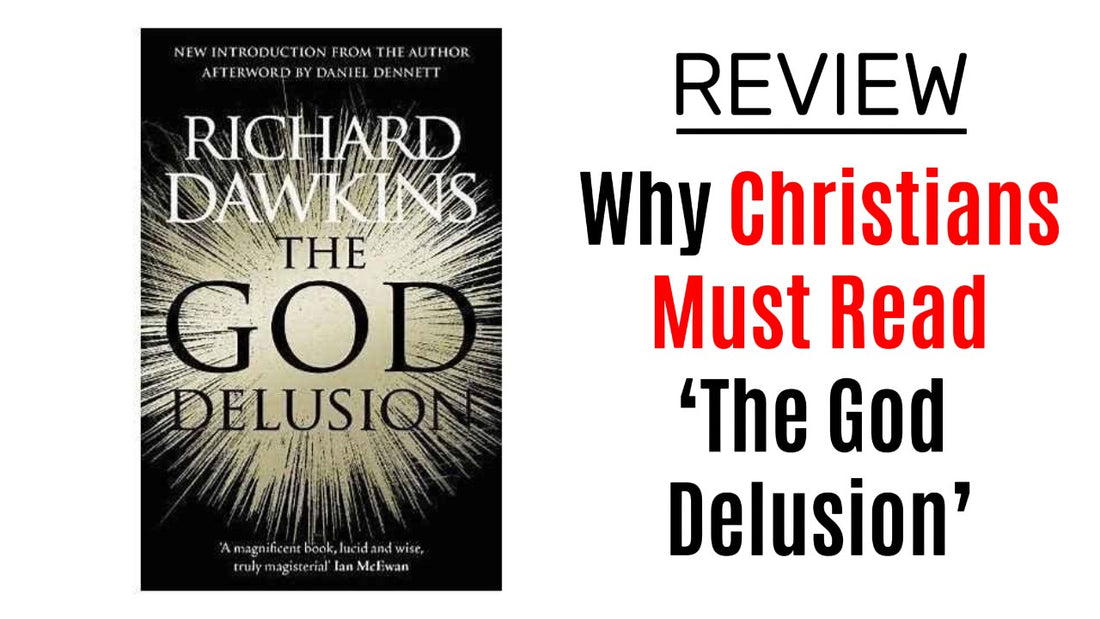
A Christian’s Review of “The God Delusion” by Richard Dawkins: An Honest and Thoughtful Analysis
I’ve always been eager to deepen my understanding of faith and engage in meaningful conversations. It’s in this spirit that I decided to read Richard Dawkins' “The God Delusion.” Although I knew going into it that Dawkins and I wouldn’t see eye-to-eye, I wanted to hear his arguments directly to better understand the perspective of those who question or reject belief in God. For anyone interested in theological debates, whether you’re a believer, skeptic, or somewhere in between, I’ll be sharing my thoughts on the book, its main arguments, and how it measures up to other works like C.S. Lewis’ Mere Christianity.
"Mere Christianity" Review: A Spiritual Classic that Transforms the So – Lafia Craft

Specific Arguments and Themes in “The God Delusion”
1. Religion and Morality: Can We Be Good Without God?
In The God Delusion, Dawkins argues that moral behavior doesn’t require belief in God. He presents the idea that our sense of right and wrong can be attributed to evolutionary biology, rather than divine commandments. For Christians like me, this is a significant point of contention. I believe that our moral compass is ultimately guided by God’s Word, yet Dawkins’ viewpoint encourages us to consider how our moral intuitions might still serve a higher purpose, even if one dismisses their divine origin.
2. Evolution vs. Creationism: Is There Room for Faith?
One of the most prominent themes in Dawkins’ book is his criticism of creationism and intelligent design. He passionately defends Darwinian evolution and claims that science and faith are inherently incompatible. Personally, I see no contradiction between science and belief in God. For me, scientific discoveries only further reveal the intricacies of God’s creation. Dawkins, however, insists that belief in a Creator is an unnecessary hypothesis. While his arguments are compelling to some, I found them lacking in acknowledging the spiritual experiences that many believers, myself included, find undeniable.
3. The Problem of Evil: A Challenge to God’s Existence?
Dawkins takes on one of the oldest and most challenging questions in theology—the problem of evil. He argues that the existence of suffering and evil is incompatible with a benevolent and omnipotent God. This is where I think Dawkins misses the mark. As a mother who has faced personal tragedies, I’ve found that faith offers a way to navigate suffering with hope. While Dawkins views the presence of evil as proof against God, I see it as a part of the larger, incomprehensible tapestry of life, one that ultimately leads us back to God’s grace and mercy.
4. The Existence of God: Where Does the Evidence Lead?
The central premise of The God Delusion is Dawkins’ assertion that belief in God is a “delusion.” He provides several arguments intended to show that God’s existence is highly improbable. From my perspective, these arguments are thought-provoking but fail to grasp the full picture. Faith isn’t just about evidence—it’s about trust, love, and a personal relationship that transcends what can be proven or disproven in a laboratory.
5. Religion and Science: Opposing Forces or Complementary Partners?
Dawkins portrays science and religion as fundamentally at odds. He believes that faith-based thinking hinders scientific progress. I see things differently. Science answers the “how” questions, but faith addresses the “why.” When viewed in this way, science and faith can complement each other, offering a more complete understanding of the universe.
6. The Nature of Consciousness: Is There More Than Meets the Eye?
Dawkins touches on the subject of consciousness, presenting it as a natural phenomenon with no need for a soul or higher power to explain it. But as someone who has felt God’s presence deeply and personally, I can’t help but see consciousness as a reflection of our divine image. To reduce it to mere neurons and synapses misses the profound depth of what it means to be human.
Related Figures and Debates
One of the strengths of The God Delusion is its engagement with other thinkers and debates. Dawkins often references debates with Christian apologists like William Lane Craig and the late Christopher Hitchens. It’s worth watching the famous debate between Dawkins and Craig, where both sides presented strong arguments. For those interested in a comparative analysis, I recommend reading C.S. Lewis’ Mere Christianity. It offers a compelling counterpoint to Dawkins’ views, focusing on the rationality and moral necessity of faith.
How Does “The God Delusion” Compare to Other Books?
If you’re looking for a contrasting perspective, Sam Harris’ The End of Faith and Daniel Dennett’s Breaking the Spell are also worth exploring. These books, along with The God Delusion, form a sort of “atheist trilogy.” Yet, for those of us who hold onto our faith, these books can be an opportunity to reaffirm what we believe and why we believe it.
Commonly Asked Questions
Let’s tackle some common questions people have about The God Delusion:
-
Is “The God Delusion” Worth Reading? Absolutely. Even if you disagree with Dawkins, reading opposing viewpoints can strengthen your understanding of your own beliefs.
-
What Is the Main Argument of “The God Delusion”? Dawkins argues that belief in God is irrational and that science provides a more satisfying explanation for the universe.
-
How Does Richard Dawkins Prove God Doesn’t Exist? Dawkins doesn’t “prove” God doesn’t exist; rather, he presents arguments to suggest that God’s existence is unlikely.
-
Is “The God Delusion” Convincing? That depends on your perspective. For some, Dawkins’ arguments are compelling. For others, like me, they serve as a reminder of the beauty and mystery that science alone can’t explain.
-
What Are the Criticisms of “The God Delusion”? Critics often point out that Dawkins dismisses religious experiences too quickly and fails to engage deeply with theological arguments.
Conclusion: A Christian Mother’s Perspective on “The God Delusion”
In the end, The God Delusion challenged me, frustrated me, and made me reflect on my own faith in new ways. It’s a book that’s worth reading, even if it’s only to understand where atheists like Dawkins are coming from. For Christians, it’s an opportunity to think critically about what we believe and why. While I disagree with Dawkins on many points, I respect his passion and his willingness to engage in this debate. After all, the search for truth is something we should all strive for—no matter where that journey leads.
If you’ve read The God Delusion or have any thoughts on the topics discussed, I’d love to hear from you! Feel free to share your thoughts in the comments below.
Where to Buy?
The God Delusion” by Richard Dawkins - Search Shopping (bing.com)




